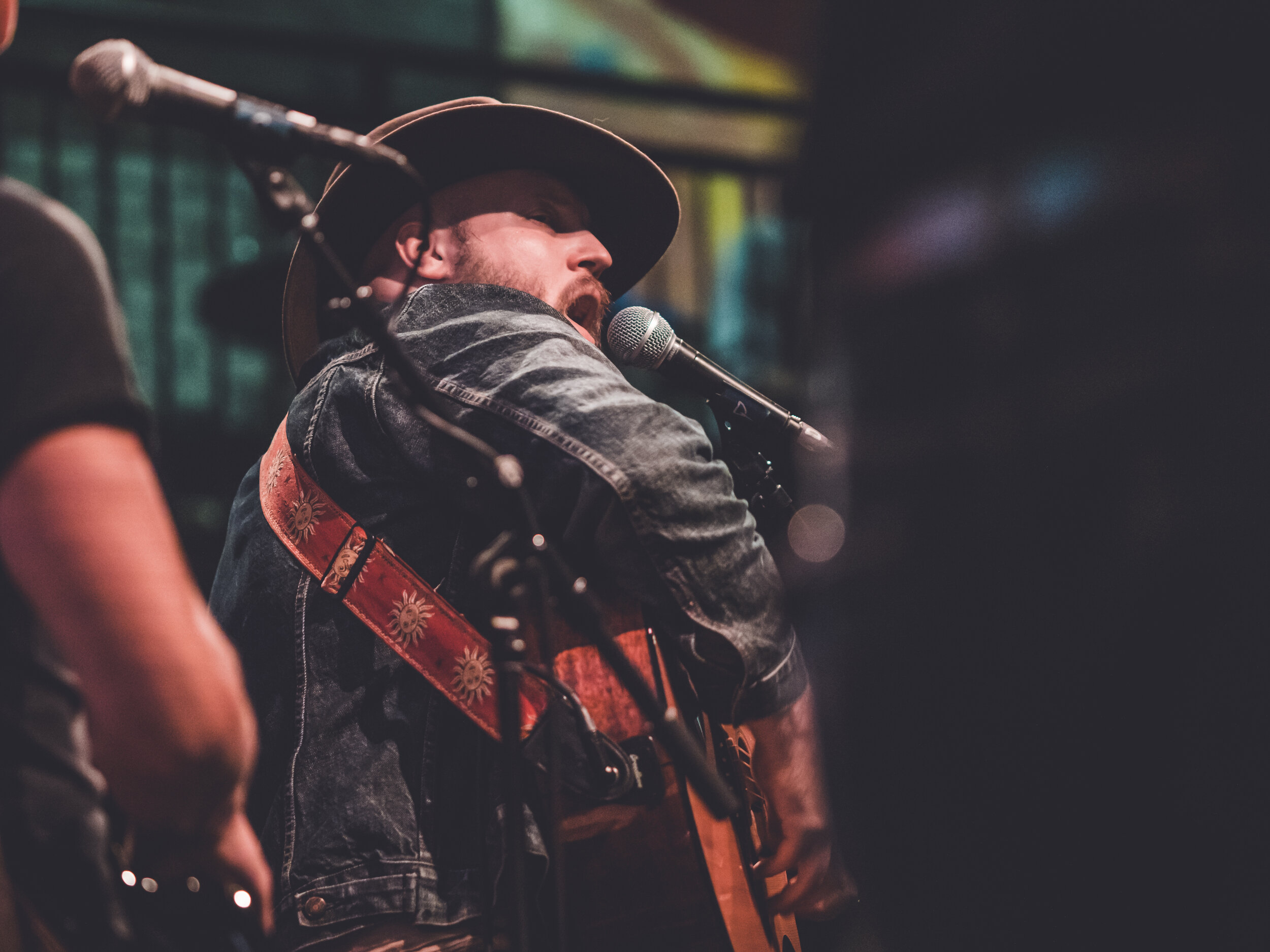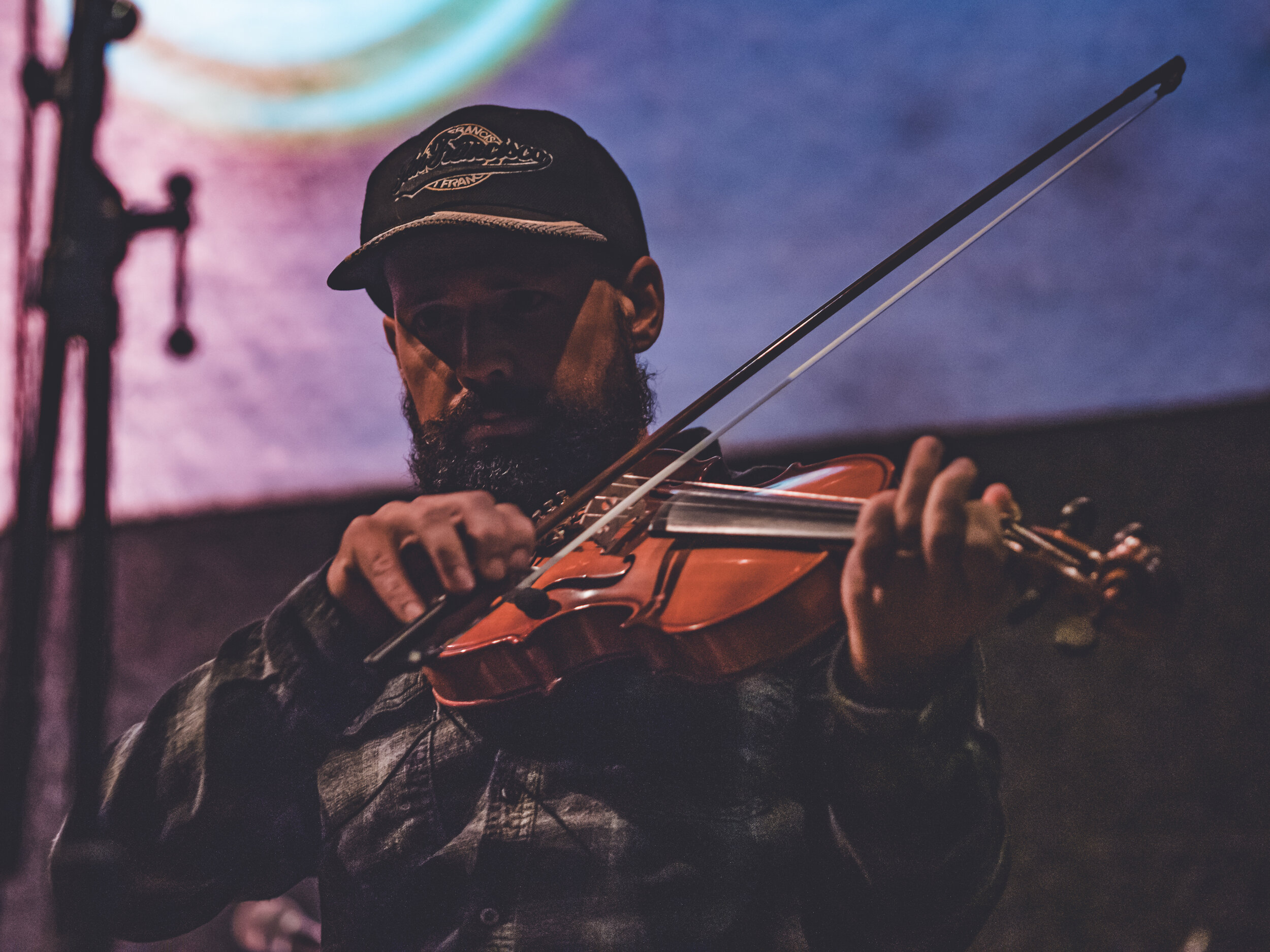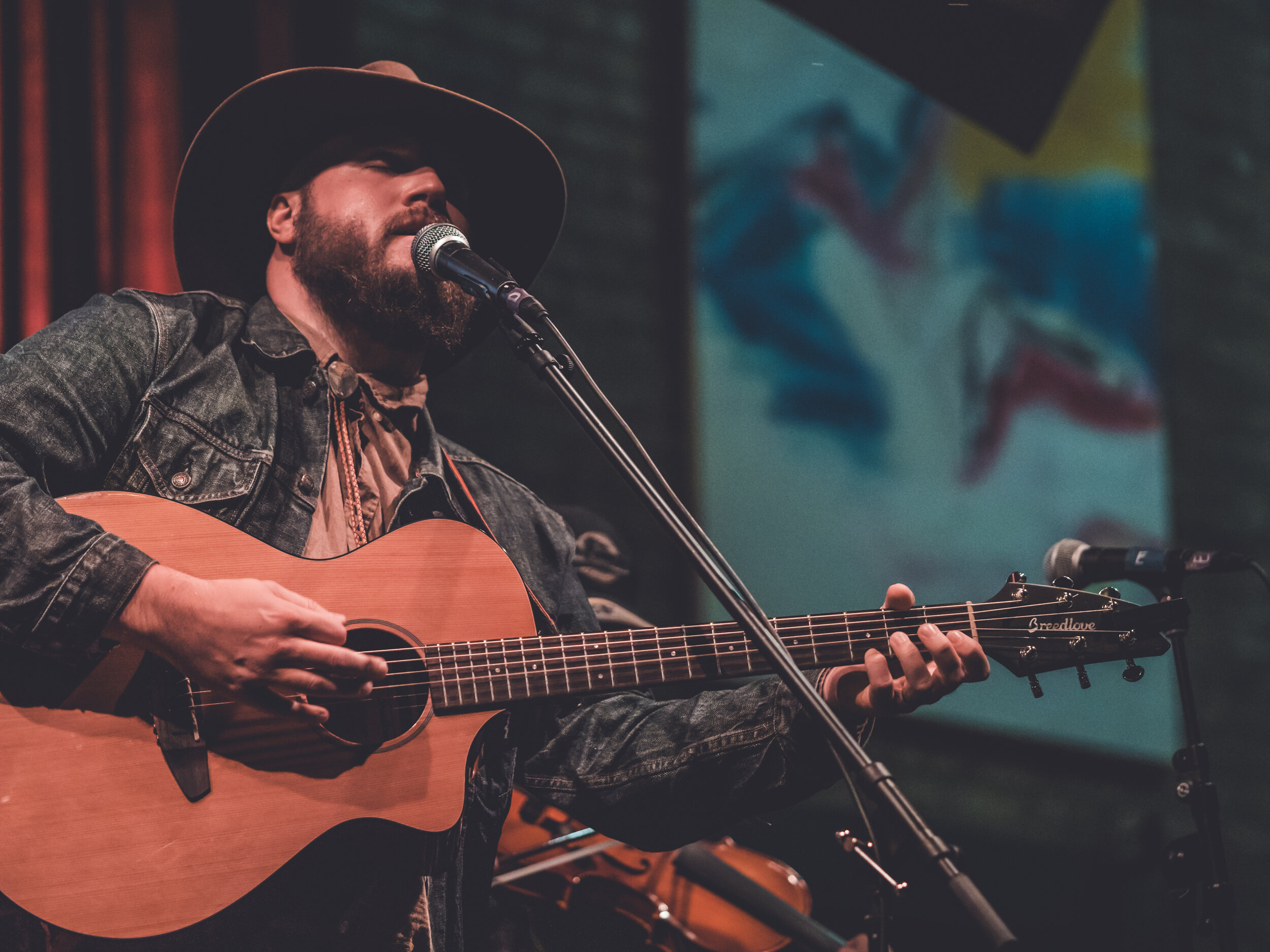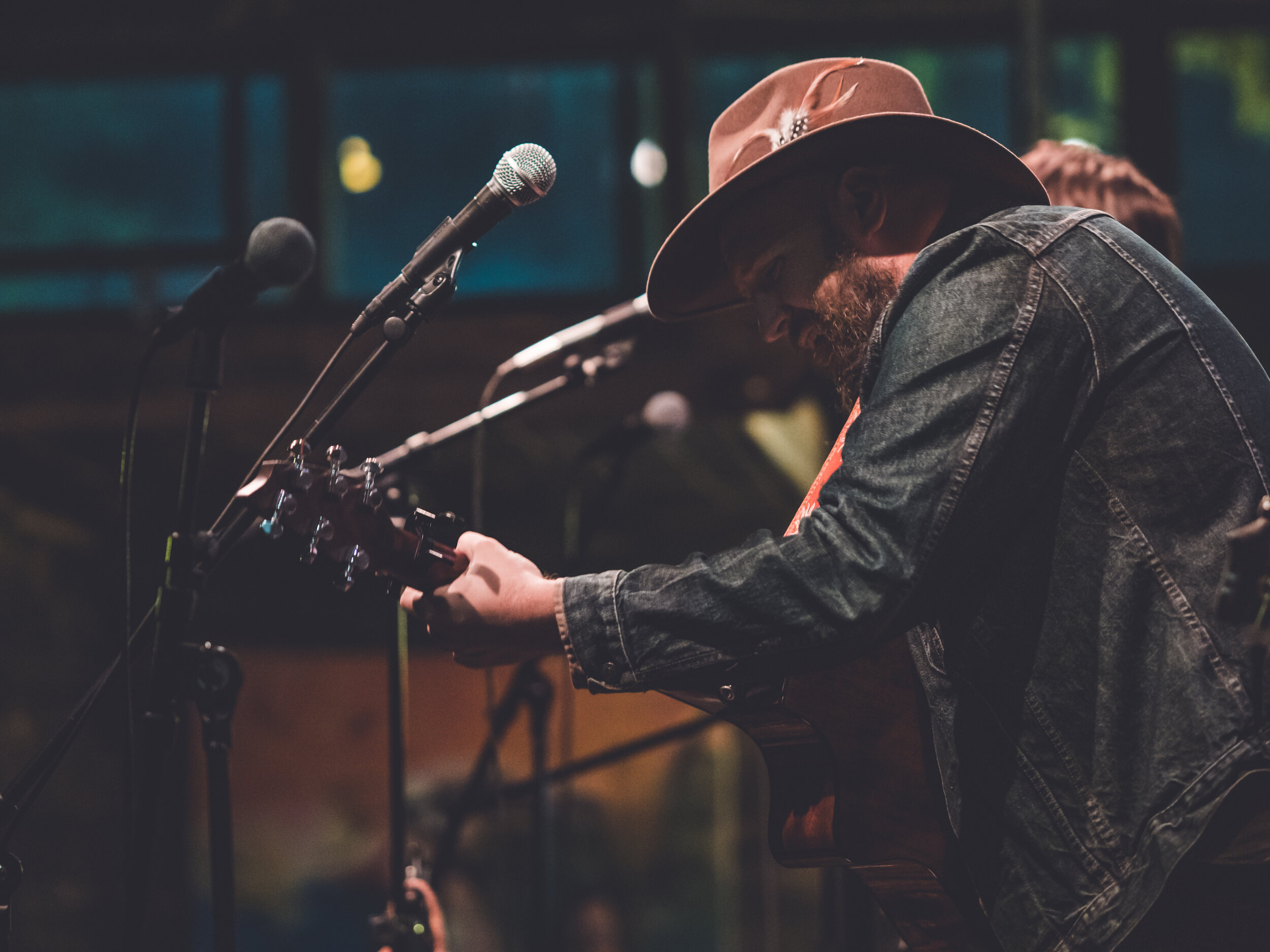Music Review: Maygen & The Birdwatcher, ‘Moonshine’
The unlikely pair’s first full-length album highlights their individual and collective talents in a wide but fluid range of Americana sounds.
When I first heard the name Maygen & The Birdwatcher, I assumed Maygen Lacey was the frontwoman and “The Birdwatcher” her backup band. The fact that this act actually has two leaders—Lacey and Noah Neumann—is just the first of several charming surprises about Moonshine, the first full-length release from the duo.
Released on October 10 (and celebrated that same night with a sold-out show at Icehouse in Minneapolis), Moonshine is an eight-song collection that traverses a broad swath of Americana, from folk to blues to country, with a hint of Southern roots rock. Modern-sounding melodies and vocals (plus drums and the occasional electric guitar) contrast with acoustic instrumentation—fiddle, mandolin, banjo—that tie their sound back to older country music.
That interesting push-and-pull between old and new sounds dovetails with another intriguing friction—Lacey’s and Neumann’s very different voices. Sometimes one or the other takes the helm on a song, while other times they meet in the middle, their differences not smoothed over but rather creating a new, third texture.
All this lends a backdrop for one of those records where you don’t know what’s going to happen next musically, but this diversity and tension of sounds lends itself quite well to the themes of the lyrics, which touch on change, on working to find common ground, on finding joy in (or at least learning to live with) discomfort.
The first track, “Change Is,” a capella save for tambourine and some subtle drums, sets the mood like the incantation of a spell. Lacey’s fine, clear voice soars over layered harmonies, heralding what’s next on the album: “Change is comin’ / You can will it in the right direction, you can ask it not to call / But change is comin’ comin’.”
The pause after the final notes feels breathless—and then the album launches into “Dominé,” a breezy uptempo country-rock song rich with banjo, drum and fiddle. Neumann sings lead, opening with a soulful rasp that’s a complete 180 from Lacey’s vocals in the previous song—although he soon reveals a sweet, smooth side of his own voice. The lighthearted bounce of the tune belies some unexpectedly bittersweet lyrics about a complicated, mismatched relationship: “We both bathed in those high hopes / And you used to laugh at my jokes / Felt so good when we were just kids … it should get better but it don’t / we should call it quits but we won’t…” Yet another one of the surprising contrasts in an album packed with them.
The next song, “Jigsaw,” tilts the scales a bit farther toward country and folk, and Lacey takes the mic, singing another song of relationship complications, though this is more clearly about a settled relationship (kids, couples therapist and all) and celebrates the differences of the pair, optimistic that their opposite natures can result in a stronger bond:
You take yourself so seriously, I float with the slightest breeze
A hardworking man and a rose-glass-colored dreamer
Well if dreamin’ hard don’t pay the bills and slavin’ away don’t pay off either
Seems to me we’re a puzzle that needs shapin’
There’s got to be some in-between
We all know we can come together
A place where we know it’s safe to be ourselves
The song ends with Lacey and Neumann singing together, their voices growing more and more urgent with each repetition of the refrain: “Don’t quit on me now.”
“Full Moons” amps up the tempo along with the presence of the fiddle and banjo, and Neumann and Lacey join forces for close-harmony vocals throughout. Despite the even more rollicking feel of the music, the narrator could be the same one from “Dominé,” more tired and conflicted than before. Weary of love that “waxes and wanes” like the moon—“I’m a little tired of chasing you from room to room / when you’re the one that’s always done me in”—his “ramblin’ days are over” and he could use some stability—“Now I only dream of full moons, full moons every day,” the chorus longingly intones.
“Antidote” starts out with just an acoustic guitar and Lacey’s sweet vocals, and some subtle callbacks to the previous song’s imagery: “I never thought too much about the constellations / I never thought about the pull of the moon.” But in this one, the narrator turns the mirror on herself, seeing everything that makes it hard to succeed in a relationship. Nevertheless, there’s a much happier outcome than the endlessly conflicted subjects in “Dominé” and “Full Moons”:
I know I’m stubborn and I take too long to come around
Your constant patience is the key that brings my walls down
The way I’m made was written in the stars light years ago
You must’ve been there though ‘cuz honey you’re my antidote
More acoustic instruments come into the song, building soft healing layers of sound, but Lacey’s vocals stand alone on this one, appropriate for the quiet contemplation of a woman who’s found something she’s surprised she can have and didn’t know she was looking for.
The next song brings back the drums and Neumann’s backing vocals, but there’s still a quietness about it, reflecting some of the themes of “Antidote.” Lacey takes the lead again, this time with a story song about a couple that sticks it out through thick and thin:
He came from a life that was constant with change, no end, no rest
Always waitin’ for the other shoe to drop, and it always did
But something changed when he met that girl
The way she said ‘You’re gonna be all right’
Life’s far from perfect for the pair, but they make it through: “I’m never leaving your side,” the last line repeats with certainty and conviction.
After a string of songs about relationships good and bad, “Gunflint Lake” is a surprise but a respite for both the listener and the narrator, who takes a breather from city life and a year that’s been one “for the books and not in a good way” (can I hazard a guess that the year in question is 2020?). Nature is not idyllic in this song: “I’ve got at least a hundred bites over every part of me / I need a tick check in all the places I can’t see / Sunburn stinging cuz I didn’t pay attention and the sweat’s drip-dripping.”
But the beauty more than makes up for it: “then the sun sets over Gunflint Lake and the fire smoke’s winding down our day / hear that loon call saying you’re in God’s country; let go and let be.” The tempo changes briefly for the moral of the story, which could be a mantra for everyone after the past couple years we’ve had, many of us finding strange silver linings in the midst of the trauma: “Soak it all in, all the bad with the good.”
If “Gunflint Lake” was a twist (at least lyrically) from the previous songs, “Anytime” is the most unexpected track of all. Neumann takes the lead after three tunes sweetly rendered by Lacey, and he cranks up his bluesy growl as if to make the contrast as big as possible. Lightly distorted electric guitars wail and Lacey provides doo-wop-esque backup vocals on this straight-up swampy Southern blues-rock ballad. What sounds like a worshipful love song with the refrain “You can use me anytime, anytime, anytime” is actually an ode to “momentary love,” and the refrain twists cleverly and unexpectedly toward the end: “you can leave anytime, anytime, anytime.” It’s a sassy, grimy end to an often sweet (but never saccharine or predictable) album.
Lacey and Neumann’s interplay with their band and each other—the way they support each other’s starring parts and come together to build songs—is a delight to see live, as I experienced at their album release show (see a photo slideshow below!). In many ways, Maygen & The Birdwatcher feel like a collaboration between two distinct artists versus a more seamless band—but it's that individuality, those visible seams, that make them such a fascinating act.



















Maygen & The Birdwatcher at their album release show, Icehouse, Minneapolis, 2021.
All photos by Tom Smouse.
Carol Roth is a full-time marketing copywriter and the main music journalist and social media publicist for Adventures in Americana. In addition to studying the guitar and songwriting, Carol’s additional creative side hustle is writing self-proclaimed “trashy” novels under the pseudonym @taberkeley!




